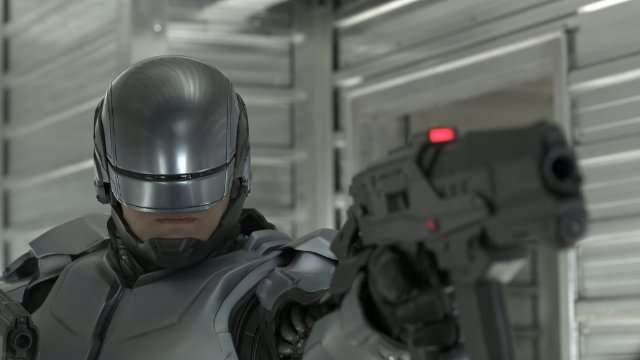RoboCop
The ghost in the machine.

If we must have a remake of Paul Verhoeven's 1987 RoboCop—and it appears that we must—Brazilian director José Padilha has found a smart way to do one. First, hire actors who can enliven the proceedings beyond the call of genre. Then, dial down the bloody mayhem just a bit and expand the story's original focus—on municipal and corporate corruption—to also take in the alarming contemporary phenomenon of militarized police forces. The philosophical themes that made Verhoeven's film so unexpectedly touching—what is free will? what does it mean to be human?—naturally remain in place.
Casting Joel Kinnaman (of AMC's The Killing) to succeed Peter Weller in the role of Detroit cop Alex Murphy was a wise call. Like Weller, Kinnaman has a quiet, graceful presence, and is capable of projecting internal concerns with a minimum of facial signaling. He's just right as Murphy, a man who comes to have more on his mind—or what's left of it—than he can easily express.
The story has been significantly revised, but the outline is familiar. Murphy's pursuit of a drug and weapons kingpin named Vallon (Patrick Garrow) marks him for termination. Vallon assigns a team of dirty cops in his employ to take Murphy out. When a car bomb renders Murphy dead—well, mostly—his wife, Clara (Abbie Cornish, making the most of a stereotype role), and their son David (John Paul Ruttan), are of course traumatized. But Raymond Sellars (Michael Keaton), the head of an international robotics company called OmniCorp, welcomes the news.
OmniCorp manufactures crime-fighting robots; they're already in use around the world, but their clomping menace is scary, and pantywaist politicians have banned them in the U.S. What's required to win over the public, Sellars decides, is a human touch. When the surviving bits and pieces of bomb victim Murphy become available, Sellars assigns his top researcher, Dr. Dennett Norton (Gary Oldman), to install them in a new kind of robot—"a product with a conscience." Norton is reluctant, but initially plays along. OmniCorp armorer Mattox (Jackie Earle Haley) is disdainful of the Murphy project (he cues up the Wizard of Oz song "If I Only Had a Brain" during training sessions). But a right-wing cable ranter named Novak (Samuel L. Jackson in full feather) bellows approval from the sidelines.
Padilha (Elite Squad) is an urban-action specialist, and he's right at home with the rainy nightscapes and shaky-cam shootouts on view here. But he also deploys the requisite sci-fi CGI for emotional effects. The lab scenes in which Murphy's high-tech cyber-suit is pulled away to reveal what little is left of his body (he's basically a head, a hand, and a pair of lungs) are eerily poignant. ("It's not a suit," Norton gently explains. "It's you.") And another scene, in which the doctor is treating a patient who has lost his hands, neatly thrums the story's central chord: the patient, a classical guitarist, has been outfitted with electro-mechanical prosthetics; we see these new "hands" expertly negotiating a guitar fretboard, but when the patient becomes caught up in what he's playing, the piece falls apart—music stirs emotion, and human emotion short-circuits the OmniCorp robotic system.
To overcome this problem, the post-human Murphy is medically drained of all residual feelings, turning him into little more than a passenger onboard a high-tech killing machine. Cutting a merciless swath through the local underworld, he becomes a hero to the crime-plagued populace. But within his metal exterior, a human heart (or maybe a soul?) still resides. This becomes a problem, and Sellars begins to wonder, "What's better than a hero?" Answer: "A dead hero."
The movie is a lot more fun than anyone might expect. (Keaton, especially, seems to be having a ball.) It's a fresh take, fast, funny and touching. If it's not a masterwork, at least it's not just another robo-remake, either.


Show Comments (56)